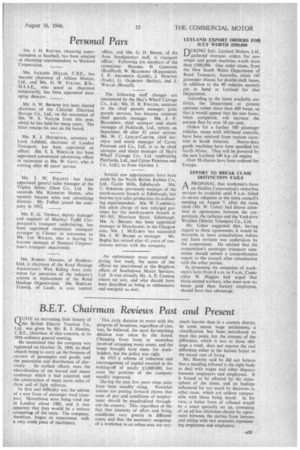B.E.T. Chairman Reviews Past and Present Q UITE an interesting little
Page 23

If you've noticed an error in this article please click here to report it so we can fix it.
history of the British Electric Traction Co., Ltd., was given by Mr. R. .1. Howley, C.B.E., chairman of that concern, at its 50th ordinary general meeting.
He mentioned that the company was registered on October 26, 1896, its chief objects being to carry on the business of carriers of passengers and goods, and the generation and distribution of elec tricity. Its earliest efforts were the electrification of the horsed and steam tramways which it had acquired, and the construction of many more miles of these and of light railways.
Its first real difficulty was the advent of a new form of passenger road transport. Motorbuses were being tried out in London about 1905, and it was
• apparent that they would be a serious competitor of the tram. The company, therefore, began to experiment with a very crude piece of machinery. This early decision to move with the progress of invention, regardless of cost, was, he believed, the most far-reaching decision ever taken by the board. Changing -from Tram to motorbus involved scrapping many assets, and the losses brought hard times for stockholders, but the policy was right.
In 1915 a scheme of reduction and rearrangement of capital resulted in the writing-off of nearly £1,000,000, but soon the position of the company steadily improved.
During the past few, years wage costs
have been steadily rising. Powerful unions are putting forward claims that rates of pay and conditions of employment should be standardized throughout the country. This, regardless of the fact that intensity of effort and living conditions vary greatly in different areas, and that the necessary outgoings of a workman in an urban area are very much heavier than in a country district. In some recent wage settlements, a classification has been introduced to meet this point, but the amount of the difference, which is two or three shillings a week, does not express the real difference either in the human factor or the actual cost of living.
Mr. Howley said he did not believe that a standing tribunal is the right body to deal with wages and other disputes between employers and employees. It is bound to be affected by the atmosphere of the times, and its findings influenced far too much by decisions in other cases, which are seldom comparable with those being heard. In his view, a better form of tribunal would be a court specialty set up, consisting of an ad hoc chairman chosen by agreement between the parties from lawyers and sitting with two assessors representing employees and employers,




































































